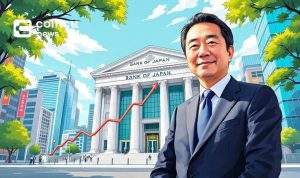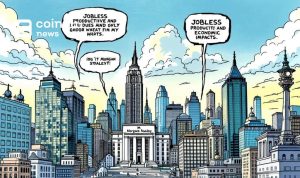- Chicago Fed addresses tariff impacts on inflation and growth.
- Internal disagreements within the Fed about tariff effects on consumer pricing and supplier stability.
- The need for long-term strategies in response to tariff-induced market changes.

Chicago Fed President Evans addressed the pressing issue of tariff impacts on the economy in statements made on April 9th, emphasizing concerns over inflation and growth. The statements shed light on internal disagreements within the Fed on tariff ramifications and policy responses.
BlockBeats News reported that Chicago Fed President Charles L. Evans stated the magnitude of tariff implementation has significantly exceeded initial model predictions. These developments underscore the need for the Fed to consider long-term strategies rather than reacting to immediate market volatility. The Federal Reserve finds itself at a pivotal crossroads, as debates intensify over how quickly tariffs will impact prices and supply chains. Fed officials caution that premature decisions could exacerbate supply shocks, leading to further economic strain.
Internal Fed Disagreements
Internal Fed disagreements have surfaced, particularly in how tariff increases will translate to consumer pricing and potential supplier bankruptcies. These uncertainties pose challenges for achieving monetary policy objectives and controlling inflation within target limits. The complexity of managing tariffs’ impact without hampering growth remains a focal point of discussion.
Economic History Echoes as Fed Seeks Resolution
Historically, tariffs have created inflationary pressures and fostered debate over monetary policy paths. The current situation mirrors past concerns where fiscal and trade policies prompted discussions on economic growth sustainability. Experts acknowledge the significant influence of tariffs on inflation trajectories, necessitating cautious and informed approaches to policy adjustments.
In light of these events, experts urge the Fed to maintain vigilance and adopt data-guided decisions to balance inflation control with economic stability. Evans’ prior caution against overshooting is echoed by current officials who seek to navigate these complex challenges effectively. The overarching question remains how the Federal Reserve will tailor its strategies to mitigate tariff-induced disruptions while ensuring economic resilience.
Overshooting is costly… it is important to assess how our policies balance inflation control with economic growth — Charles L. Evans, former president & CEO, Federal Reserve Bank of Chicago, Fortune.























